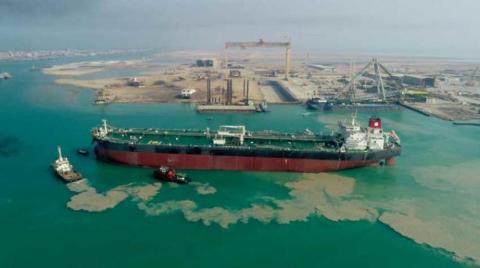
MEXICO CITY (Reuters) - On Aug. 21, a tanker called the Otoman docked at the Jose oil terminal on Venezuela’s coast in the Caribbean to load 1.82 million barrels of heavy crude, according to the state oil company’s internal documents.Yet no tanker with that name is registered in major global shipping databases.
Muddying the situation further, the unique identifier for the Otoman listed in the documents - a number used by the International Maritime Organization to identify ships - was assigned to another tanker called the Rubyni, according to the databases.
The Rubyni was broken up two years ago, they record. Satellite images provided by TankerTrackers.com, an independent vessel tracking service, show the ship was scrapped on the coast of Bangladesh in 2018.
The misidentification of the Otoman is not an isolated error, according to company documents seen by Reuters, shipping databases and corporate registries, as well as interviews with Iranian state officials and four people close to the state oil producer, Petroleos de Venezuela SA (PDVSA).
Since the United States imposed sanctions on Venezuela in 2019, the state firm and some shipping agencies have been ignoring protocols for checking tanker identity, sources close to PDVSA said. This is part of a smokescreen which, according to one Iranian official, Tehran has helped develop so Venezuela’s oil exports can continue.
The falsely named ship is part of the cat-and-mouse game that Caracas is playing with Washington across the globe.
A previous Reuters investigation found the largest portion of cargoes that set sail from Venezuela since 2019 went to China. The Otoman and other cases show a host of customers in Russia - one of Venezuela’s closest allies - are chartering misidentified vessels to export Venezuela’s oil to Asia.
PDVSA and Venezuela’s oil ministry did not respond to requests for comment for this story.
Asked if the Kremlin was aware of any Russian-based companies involved in trading Venezuelan oil, a spokesman did not respond, although he criticized U.S. sanctions.
“We consider sanctions on Venezuela to be illegal from an international law perspective,” he said. “Venezuela is an important partner for Russia in Latin America.”
An Iranian oil ministry official involved in talks with Caracas said Iran, which has delivered gasoline, condensate, food and refinery equipment to Venezuela, will continue this.
“U.S. sanctions cannot stop us from doing business with each other. New shipments will take place soon,” he said, referring to those supplies. Venezuela has lost most of its capacity to refine its own oil.
The U.S. Treasury, which operates sanctions policy, did not reply to a request for comment. A State Department spokesman said the U.S. government is aware that Venezuela is increasingly turning to Iran for assistance with its oil sector. “These regimes are leading one another down a dead-end street that will not benefit their citizens,” he said.












